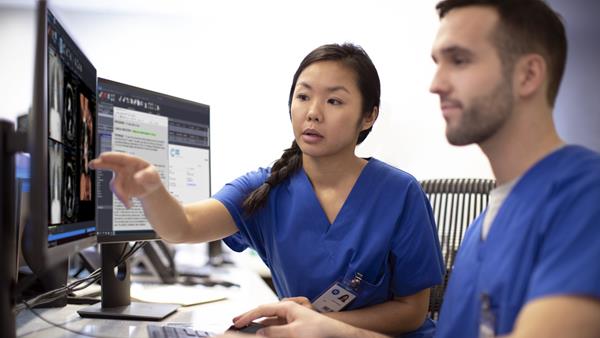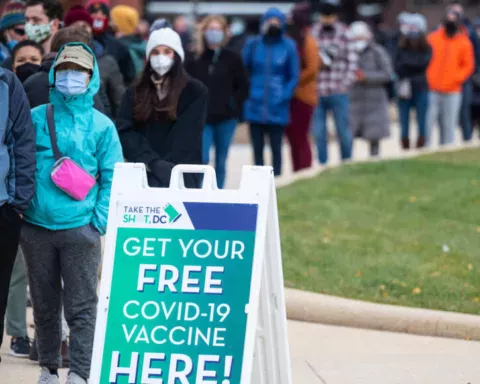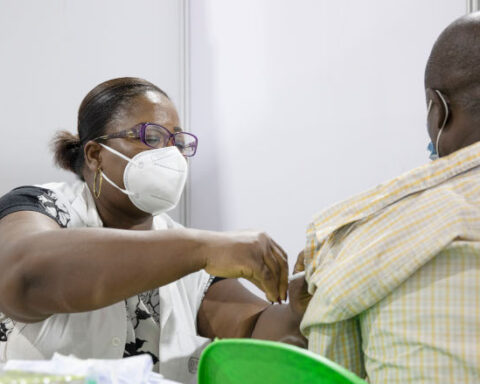Amsterdam, the Netherlands and Guildford, United Kingdom –The NCCID is a centralized database containing X-Ray, CT and MRI images from hospital patients across the country. It aims to support a better understanding of the COVID-19 virus and develop AI-powered technology which will enable the best care for patients hospitalized with a severe infection [2]. This first regional hub is integrating data across 13 NHS trusts in the consortium. The deployment of a single centralized and secure server has provided access to 15 years of imaging data across 2.5 million people in the region, the largest single data source for NCCID.
The Cheshire and Merseyside consortium engaged with Philips to help with enabling access to the entire region’s imaging data through a single hub. Philips’ advanced data integration solution for radiology, Philips Global worklist, was used to enable easy integration with the NCIDD’s secure central SMART Box server that will be required to support mass data collection, management and de-identification and can facilitate multiple trials/research projects simultaneously.
“One of the findings coming out of the end of this project will definitely be to focus on regional hubs that will be able to coordinate and better centralize the data, a hub just like Cheshire and Merseyside,” said Prof Mark-Halling Brown, Head of Scientific Computing at Royal Surrey NHS Foundation Trust. “It can take many months or even years to set up SMART boxes at individual trusts, so doing it regionally is the only way to scale up nationally.”
With a single regional SMART box we have been able to gain access to the images from the 13 Trusts within the Cheshire and Merseyside consortium.
Steve Sparks
Professional Services Manager Radiology Informatics at Philips UK&I “Most District General Hospitals average 250,000 to 350,000 imaging exams per year,” said Steve Sparks, Professional Services Manager Radiology Informatics at Philips UK&I. “With a single regional SMART box we have been able to gain access to the images from the 13 Trusts within the Cheshire and Merseyside consortium.”
Save Radiologists’ time, increase the safety and consistency of care
The NCCID database is developed in collaboration with NHSX, an organization driving the digital transformation of the NHS, The British Society of Thoracic Imaging (BSTI) and The Royal Surrey NHS Foundation Trust. The database is being used for the validation of AI products for use in the NHS, aiding the diagnosis and treatment of COVID-19 in the UK population. This data has the potential to enable quicker patient assessment when arriving at hospital’s emergency departments, save Radiologists’ time, increase the safety and consistency of care across the country, and ultimately save lives. It is being made available to researchers, clinicians, technology companies and all those wanting to investigate the disease and develop solutions that can support the COVID-19 patient care pathway.
The SMART box server technology will also enable Cheshire and Merseyside to participate in research into many areas requiring large volumes of clinical imaging data. The COVID-19 pandemic has highlighted the potential for medical imaging systems powered by AI. The NHS AI Lab, created last year within NHSX, is developing a National Medical Imaging Platform with the purpose of creating a pipeline for patient data to be used within AI technology across conditions other than COVID-19. The NCCID is one workstream taken forward by the NHS AI Lab at NHSX, which will accelerate the safe, ethical, and effective adoption of AI in the healthcare sector. The power of large-scale data collection has already been demonstrated in various studies, including breast cancer screening studies such as OPTIMAM. Setting up regional hubs, such as the SMART box deployment in Cheshire and Merseyside, will aid the creation of these large-scale National databases and AI technology to help combat a variety of conditions.
Comprehensive portfolio for COVID-19 high-quality care
Philips has a comprehensive portfolio of products, services and solutions to support the delivery of high-quality care to COVID-19 patients worldwide. Solutions include secure, connected and intelligent approaches to diagnosis, treatment and predictive monitoring in the hospital, plus screening, remote patient monitoring and care at home. Philips’ telehealth and AI-enabled data analytics can help support workflows, facilitate remote collaboration and optimize resources. Philips’ COVID-19-related solutions are designed for rapid deployment and scalability.






